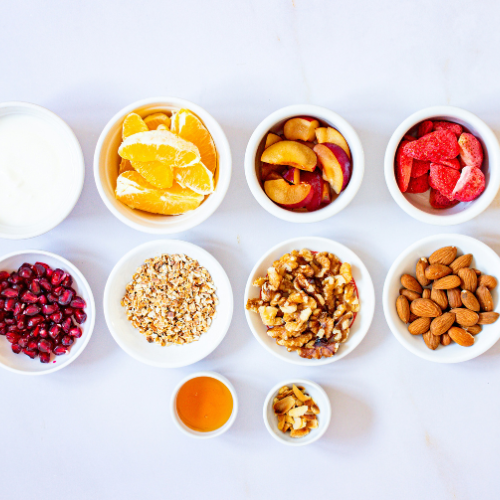Inflammation is a natural response by the body to injury or infection, but chronic inflammation is linked to various health issues, including heart disease, diabetes, and arthritis. Incorporating anti-inflammatory foods into your diet can help reduce chronic inflammation and support overall health.
Understanding Inflammation
Acute vs. Chronic Inflammation:
Acute Inflammation: This is a short-term response to injury or infection, characterized by redness, heat, swelling, and pain. It is essential for healing and recovery.
Chronic Inflammation: This is a prolonged and often low-grade inflammation that persists over time. It can be triggered by factors such as poor diet, stress, and environmental toxins and is associated with chronic diseases.
Impact of Diet on Inflammation: Certain foods can exacerbate inflammation, while others can help mitigate it. Diets high in refined sugars, saturated fats, and processed foods are known to promote inflammation. In contrast, a diet rich in anti-inflammatory foods can help reduce inflammation and improve health outcomes.
Key Anti-Inflammatory Foods
Fruits
- Berries: Blueberries, strawberries, raspberries, and blackberries are rich in antioxidants such as anthocyanins and vitamin C, which have anti-inflammatory properties.
- Cherries: Contain anthocyanins and polyphenols that help reduce inflammation and pain.
- Oranges: High in vitamin C and antioxidants that help combat inflammation.
Vegetables
- Leafy Greens: Spinach, kale, and Swiss chard are high in vitamins A, C, and K, as well as antioxidants and phytochemicals that combat inflammation.
- Broccoli: Contains sulforaphane, an antioxidant that helps reduce inflammation.
- Bell Peppers: Rich in vitamin C and antioxidants that help lower inflammation.
Nuts and Seeds
- Almonds: Provide vitamin E, an antioxidant that helps reduce inflammation.
- Walnuts: Rich in omega-3 fatty acids, which have anti-inflammatory effects.
- Chia Seeds: High in omega-3 fatty acids and fiber, which can help lower inflammation.
- Flaxseeds: Contain omega-3 fatty acids and lignans, which have anti-inflammatory properties.
Fatty Fish
- Salmon: Rich in omega-3 fatty acids (EPA and DHA) that help reduce inflammation.
- Mackerel: Another good source of omega-3 fatty acids with anti-inflammatory effects.
- Sardines: Provide omega-3s and other nutrients that help combat inflammation.
Whole Grains
- Oats: High in fiber and antioxidants that help reduce inflammation.
- Quinoa: Provides fiber, vitamins, and minerals that support anti-inflammatory processes.
- Brown Rice: Contains fiber and nutrients that help lower inflammation.
Spices and Herbs
- Turmeric: Contains curcumin, a compound with strong anti-inflammatory and antioxidant properties.
- Ginger: Has gingerol, a compound that helps reduce inflammation and pain.
- Garlic: Contains allicin, which has anti-inflammatory and immune-boosting effects.
Healthy Fats
- Olive Oil: Extra virgin olive oil is rich in monounsaturated fats and antioxidants, such as oleocanthal, which have anti-inflammatory effects.
- Avocado: Contains healthy fats, fiber, and antioxidants that help reduce inflammation.
Green Tea
- Benefits: Rich in polyphenols, particularly epigallocatechin gallate (EGCG), which have anti-inflammatory and antioxidant effects.
Beans and Legumes
- Lentils: High in fiber and antioxidants that help lower inflammation.
- Chickpeas: Provide fiber and nutrients that support anti-inflammatory processes.
Incorporating Anti-Inflammatory Foods into Your Diet
Balanced Meals: Create balanced meals by including a variety of anti-inflammatory foods. For example, a meal might consist of grilled salmon (omega-3s), a quinoa salad with mixed vegetables (fiber and antioxidants), and a handful of berries for dessert.
Snacks: opt for anti-inflammatory snacks such as a handful of almonds, a smoothie with spinach and berries, or whole-grain crackers with hummus.
Cooking Methods: Use cooking methods that preserve the anti-inflammatory properties of foods. Steaming, grilling, and baking are preferable to frying. Incorporate anti-inflammatory spices and herbs into your dishes to enhance flavor and health benefits.
Beverage Choices: Incorporate green tea into your daily routine or use olive oil as a base for dressings and cooking. opt for water, herbal teas, and fresh vegetable juices to stay hydrated and support inflammation reduction.
Lifestyle Tips for Managing Inflammation
Exercise Regularly: Regular physical activity can help reduce inflammation and support overall health. Aim for a combination of aerobic exercise, strength training, and flexibility exercises.
Manage Stress: Chronic stress can contribute to inflammation. Practice stress-reducing techniques such as mindfulness, meditation, deep breathing, and relaxation exercises.
Get Adequate Sleep: Poor sleep quality can exacerbate inflammation. Aim for 7-9 hours of quality sleep each night to support overall health and reduce inflammation.
Avoid Smoking and Limit Alcohol: Smoking and excessive alcohol consumption can increase inflammation. Avoid smoking and limit alcohol intake to support a healthier inflammatory response.
Maintain a Healthy Weight: Being overweight or obese can contribute to chronic inflammation. Adopting a balanced diet and regular exercise routine can help maintain a healthy weight and reduce inflammation.
Common Misconceptions
Anti-Inflammatory Foods Are a Cure-All: While anti-inflammatory foods can support overall health and reduce inflammation, they are not a substitute for medical treatment. A comprehensive approach to health, including medication and lifestyle changes, may be necessary for managing chronic inflammation.
All Inflammation Is Bad: Acute inflammation is a necessary part of the body’s healing process. The goal is to manage chronic inflammation, not eliminate all inflammation.
Quick Fixes: There are no quick fixes for reducing inflammation. A consistent, balanced diet combined with a healthy lifestyle is key to managing and reducing chronic inflammation over time.


